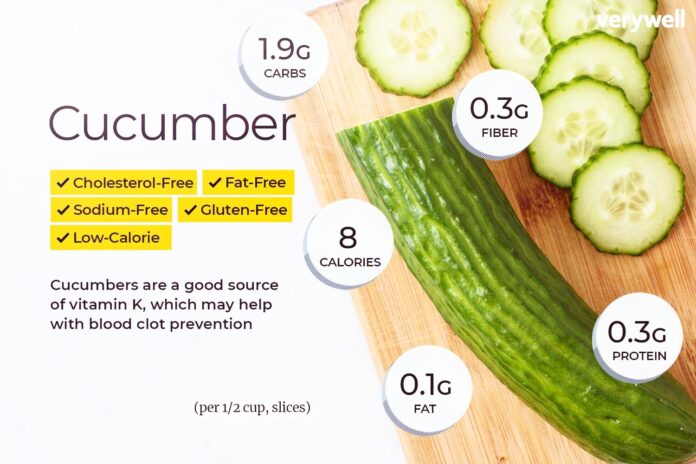health benefits of cucumbers
Cucumbers are a low-calorie, nutritious vegetable that offer several health benefits. Eating cucumber every day can provide several health benefits due to its high water content, vitamins, minerals, and fiber. Here are some potential outcomes of eating cucumber daily:
Hydration:
Cucumbers are mostly composed of water, making them an excellent source of hydration. They can help to keep the body hydrated, especially during hot weather.
Anti-inflammatory:
Cucumbers contain antioxidants and anti-inflammatory compounds that can help to reduce inflammation in the body, potentially reducing the risk of chronic diseases such as heart disease and cancer.
Skin health:
The high water content in cucumbers can help to keep the skin hydrated and reduce the appearance of puffiness and dark circles under the eyes. Additionally, the silica in cucumbers can help to strengthen the connective tissues in the skin, improving skin health.
Digestive health:
Cucumbers contain fiber and water, which can help to regulate bowel movements and prevent constipation. They can also help to soothe digestive problems such as acid reflux and heartburn.
Heart health:
The potassium in cucumbers can help to regulate blood pressure, potentially reducing the risk of heart disease. Additionally, the fiber and antioxidants in cucumbers can help to reduce cholesterol levels and improve heart health.
Weight management:
Cucumbers are low in calories and high in fiber, making them an excellent food for weight management. Eating cucumbers can help to fill you up and reduce overall calorie intake.
Bone health:
Cucumber contain vitamin K, which is important for maintaining strong bones and reducing the risk of osteoporosis.
In conclusion, cucumbers are a nutritious and versatile vegetable that can offer numerous health benefits. Including them in your diet can be a simple and delicious way to improve your overall health and wellness.
However, it’s important to note that eating too much of any food, including cucumber, can lead to potential negative outcomes. For example, consuming excessive amounts of cucumbers can cause digestive issues such as bloating and gas due to their high fiber content. Additionally, some people may be allergic to cucumbers, which can cause symptoms such as itching, swelling, and difficulty breathing. Therefore, it’s important to eat cucumbers in moderation and consult with a healthcare provider if you have any concerns about incorporating them into your diet.
Are raw cucumbers good for you?

Yes, raw cucumber are good for you and offer several health benefits. They are a low-calorie vegetable that is mostly composed of water, vitamins, minerals, and fiber. Here are some reasons why raw cucumbers are good for you:
Hydration:
Nutrient-rich:
Low-calorie:
Digestive health:
Skin health:
Anti-inflammatory:
Overall, raw cucumber are a nutritious and versatile vegetable that can be enjoyed as a snack, added to salads, or used as a dip for other foods.
Eating Cucumber at Night
Why should we not eat cucumber at night?
There is no scientific evidence to suggest that eating cucumber at night is harmful to your health. In fact, cucumber are a healthy, low-calorie vegetable that can be eaten at any time of the day.
However, some people believe that eating cucumber at night can lead to digestive problems, such as indigestion or bloating. This belief may stem from the fact that cucumber have a high water content and can act as a diuretic, which may cause you to urinate more frequently during the night. But again, there is no strong evidence to support this belief.
Ultimately, whether or not you should eat cucumber at night depends on your individual preferences and digestive system. If you enjoy eating cucumbers and don’t experience any discomfort or digestive issues after eating them at night, there’s no reason to avoid them. However, if you find that eating cucumbers at night causes digestive problems or disrupts your sleep, you may want to avoid eating them before bed.
Can cucumbers reduce belly fat?
While cucumber are a low-calorie and nutrient-rich food that can support a healthy diet and weight loss, they are not a magic bullet for reducing belly fat.
Belly fat is typically the result of a combination of factors, including genetics, hormones, diet, and physical activity levels. To reduce belly fat, you need to create a calorie deficit by consuming fewer calories than you burn through exercise and other activities.
Cucumber can be a healthy addition to a weight loss diet, as they are low in calories, high in fiber, and can help you feel full and satisfied. However, eating cucumber alone is unlikely to lead to significant belly fat reduction.
Instead, a comprehensive weight loss plan should include a balanced, calorie-controlled diet that is rich in fruits, vegetables, lean protein, and whole grains, along with regular physical activity and lifestyle changes such as stress reduction and adequate sleep.
In summary, while cucumber can support a healthy diet and weight loss, they are not a miracle food for reducing belly fat. A well-rounded weight loss plan that includes a balanced diet and regular exercise is the most effective way to achieve sustainable weight loss and reduce belly fat.
What is the 3 day cucumber diet?
The 3-day cucumber diet is a short-term, low-calorie diet that involves eating mostly cucumber for three consecutive days. It is sometimes promoted as a quick way to lose weight or “detox” the body, but there is no scientific evidence to support these claims.
The basic idea of the 3-day cucumber diet is to eat cucumber for most meals, along with a few other low-calorie foods. Here is a sample meal plan:
Day 1:
Breakfast: 1-2 sliced cucumber, 1 boiled egg.
Snack: 1 apple.
Lunch: 1-2 sliced cucumbers, 1 cup of low-fat yogurt.
Snack: 1 orange.
Dinner: 1-2 sliced cucumbers, a small piece of grilled chicken or fish.
Day 2:
Breakfast: 1-2 sliced cucumbers, 1 boiled egg.
Snack: 1 pear.
Lunch: 1-2 sliced cucumbers, 1 cup of low-fat cottage cheese.
Snack: 1 peach.
Dinner: 1-2 sliced cucumbers, a small piece of grilled chicken or fish.
Day 3:
Breakfast: 1-2 sliced cucumbers, 1 boiled egg.
Snack: 1 banana.
Lunch: 1-2 sliced cucumbers, 1 cup of low-fat yogurt.
Snack: 1 orange.
Dinner: 1-2 sliced cucumbers, a small piece of grilled chicken or fish.
While cucumber are a healthy and low-calorie food, it is not recommended to follow the 3-day cucumber diet or any other extreme diets for weight loss. Such diets may not provide enough nutrients, and the weight loss is likely to be temporary. Instead, it is better to focus on long-term lifestyle changes such as a balanced, nutrient-rich diet, regular exercise, and adequate sleep.
Does cucumber clean the gut?
Cucumbers are a good source of fiber, which is important for maintaining good digestive health and promoting regular bowel movements. Fiber acts like a broom in the gut, helping to sweep waste and toxins out of the body. The high water content of cucumbers also helps to keep the digestive system hydrated and functioning properly.
In addition to fiber, cucumber also contain antioxidants, such as vitamin C and beta-carotene, that help to reduce inflammation and support overall gut health.
While cucumber can be a beneficial addition to a healthy diet and can contribute to a healthy gut, it’s important to note that they should not be relied upon as the sole means of “cleaning” the gut. A healthy gut requires a balanced diet that includes a variety of fruits, vegetables, whole grains, lean proteins, and healthy fats, as well as adequate hydration and physical activity.
Cucumber’s disadvantages.
From a nutritional perspective, cucumbers are generally considered to be healthy, low-calorie foods that are high in water content, fiber, and certain vitamins and minerals. However, there are a few potential disadvantages or considerations to keep in mind:
Pesticide residue:
conventionally-grown cucumber may contain pesticide residue, so it’s important to wash them thoroughly before eating or opt for organic cucumber.
Oxalates:
cucumbers contain a moderate amount of oxalates, which can contribute to kidney stones in some people who are prone to them.
Digestive issues: for some people, eating large amounts of cucumbers (especially with the skin) can cause digestive discomfort such as bloating or gas.
Taste preferences:
Some people may simply not enjoy the taste of cucumbers or find them too bland, which may be a disadvantage if they are looking to incorporate more vegetables into their diet.
High water content:
While the high water content of cucumbers can be a positive thing in terms of hydration, it can also lead to a more watery texture and less flavorful dishes when used in cooking or salads.

















